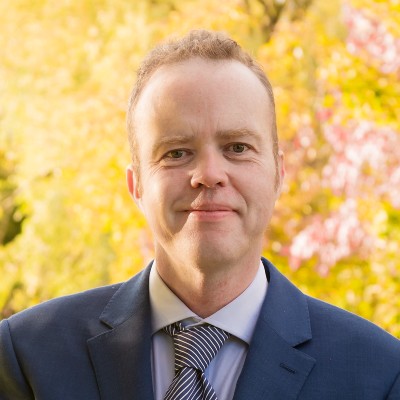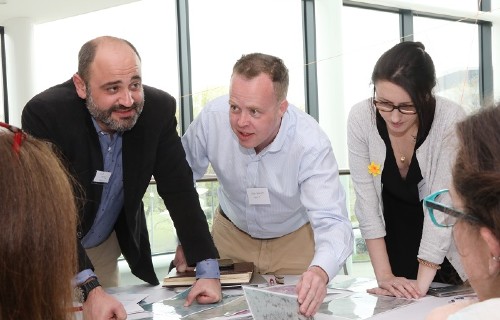Biology and medicine are morphing into data-driven sciences, and the dream of personalised medicine — finding the right medicine for the right patient at the right time — is coming into reach.
For the last two decades at UCD, cancer researchers have been at the forefront of combining laboratory and computational approaches to cancer research, as well as leading initiatives to bring all relevant stakeholders together, including the public and patients, to rapidly develop more effective person-focused diagnostic and therapeutic solutions.
The digital transformation is particularly visible in oncology, where genome sequencing in the clinic has shown the importance of data analysis in enabling clinical decisio-making, and the development of computational models that allow us to interact with and do bespoke analyses of data.
At the leading edge, cancer researchers at UCD have received strategic investment in key interdisciplinary programmes covering fundamental biomedical science to computational biology, data science and AI.
Professor Walter Kolch, Director of Systems Biology Ireland, based at UCD and Professor William Gallagher, Full Professor of Cancer Biology at UCD, co-lead of the All-Island Cancer Research Institute (AICRI), talk to UCD Research about the direction of travel of cancer.
One in two people living on the island of Ireland will develop cancer during their lifetime. To help improve the lives of many living with and beyond cancer, as well as aid prevention, there is an urgent need for greater collaboration in cancer research throughout the island of Ireland.
— Prof William Gallagher
 Professor William Gallagher, UCD, Co-lead of AICRI, Deputy Director of Precision Oncology Ireland
Professor William Gallagher, UCD, Co-lead of AICRI, Deputy Director of Precision Oncology Ireland
AICRI is borne out of historical collaboration in cancer research between the Republic of Ireland, Northern Ireland and the US, and is deepening those links and extending networks. With a comprehensive, holistic approach and the ethos ‘With the patient, around the patient, for the patient’ at its heart, this virtual institute aims to improve cancer prevention, develop novel diagnostic and therapeutic solutions and aid those living with and beyond cancer.
Additionally, AICRI represents a significant opportunity to attract key industries to the island, propagating the knowledge economy around the cancer research and innovation ecosystem and generating high value jobs. As well as building critical mass in Precision Cancer Medicine through its AICRIstart programme, it can foster a new biotech cluster, encouraging an innovative start-up and SME environment for indigenous biotech North and South.
AICRI is co-led by Professor Gallagher and Professor Mark Lawlor, Professor of Digital Health and Chair in Translational Cancer Genomics, Queen’s University Belfast, together with key inputs from colleagues at multiple institutions across the island of Ireland.
What will AICRI look like and why do we need it?
One in two people living on the island of Ireland will develop cancer during their lifetime. To help improve the lives of many living with and beyond cancer, as well as aid prevention, there is an urgent need for greater collaboration in cancer research throughout the island of Ireland. AICRI is bringing together the combined strengths of cancer researchers in Ireland and Northern Ireland to tackle cancer, linking with US and other international colleagues.
The mission of this virtual institute, which involves 10 academic institutions and linked clinical centres, along with other key stakeholders, is to provide an overarching framework for cancer research across the island of Ireland, from discovery to implementation, for the benefit of cancer patients and wider society.
How is AICRI evolving the research and innovation ecosystem on the island of Ireland?
Equity of access and opportunity lies at the heart of the AICRI philosophy and approach. We, as a community, need to overcome narrow, single institution mindsets so we can build sufficient critical mass via an inclusive approach to gain a better understanding of cancer, develop more personalised treatment options and ease suffering and save lives.
The bottom-up approach which AICRI has taken to solicit compelling ideas from the cancer research community and channel them effectively has borne fruit in terms of recent major North-South funding (over €12 million) in the areas of Precision Cancer Medicine, liquid biopsies and eHealth, as well as providing the roadmap of even greater collaboration.
What major programmes is AICRI leading?
A foundation stone for AICRI was a €4 million award in 2022 via the Higher Education Authority for a doctoral and post-doctoral training programme in Precision Cancer Medicine, called AICRIstart, which encompasses all 10 academic institutions involved, as well as Cancer Trials Ireland. The programme will train the next-generation of cancer researchers in cutting-edge scientific approaches, with an emphasis on inter-institutional collaboration.
AICRI is also a partner on a recently funded EU Cancer Mission project, called ECHoS, which aims to form a National Cancer Mission Hub in all 27 EU member states, including Ireland. AICRI will be working closely with the National Cancer Control Programme (NCCP) to establish such a Hub in Ireland, which will raise awareness of opportunities in the cancer area at the European level and help broaden participation.
 Public and Patient Involvement
Public and Patient Involvement
A key focus of the AICRI vision is to ensure that patients are actively involved in the cancer research agenda. In this respect, AICRI has had a very effective collaboration with The Patient Voice in Cancer Research (PVCR), spearheaded by Professor Amanda McCann and Elaine Quinn from the UCD Conway Institute of Biomolecular and Biomedical Research.
This included a hybrid meeting held in Cork jointly organised by AICRI and the PVCR in March 2022, as an adjunct to the annual Irish Association for Cancer Research meeting.
Professor Gallagher was Director of UCD Conway Institute from 2016 to 2021. Learn more about PVCR activities.

Professor Walter Kolch, Director of SBI and Precision Oncology Ireland
Established in 2009 under the direction of Professor Walter Kolch and Professor Boris Kholodenko, SBI has been leading the digital revolution towards accessible Precision Medicine for all.
Professor Walter Kolch is a leading international proponent of Precision Medicine who originally trained as a clinician and subsequently worked in the pharmaceutical industry, before dedicating himself to research. In addition to co-founding the groundbreaking SBI centre at UCD, he has played a central role in the development of precision oncology and medicine policy and funding at national and international level, particularly through his leading involvement in pan-European strategic initiatives including Coordinating Action Systems Medicine, Infrastructure for Systems Biology Europe, and the ELIXIR research infrastructure for life science information.
He is joined on the leadership bench of SBI by Professor Boris Kholodenko, who is a Full Professor of Systems Biology and Director of Computational Modelling at SBI.
How is computational modelling driving breakthrough research/innovation in precision medicine?
The arrival of genome sequencing in the clinic has shown us the importance of data analysis and what quantum leaps we can make based on it. Other ‘omics’ technologies (transcriptomics, proteomics, and metabolomics) are not far away from introduction into clinical labs. To understand all the data we can generate nowadays about a patient, we need more than conventional data analysis.
We need computational models of the data, which allow us to interact with the data, interrogate them and do bespoke analyses on them. Genome analysis is only one example where computational models drive clinical progress. Another example is imaging, where artificial intelligence (AI) models allow us to extract deep biomedical knowledge from images. For instance, histopathology images analysing the tumour microenvironment allow us to understand when some patients respond to immunotherapies but others do not.
Precision Oncology Ireland is a first big step towards uniting Irish cancer research efforts and also towards the adoption of digital twin models.
— Prof Walter Kolch
Since its launch, SBI has gained national and EU funding to coordinate or contribute to over
1700 projects under its research brief that realise concept development through to translation and application, in collaboration with industry and other partners. One such programme led by SBI is Precision Oncology Ireland – the largest cancer research programme in Ireland – which unites the efforts of five universities and associated hospitals, six cancer charities and seven industry partners.
Visit Precision Oncology Ireland.
SBI runs multiple large scale, international projects and training programmes. See more.
How are SBI and POI pioneering precision approaches in cancer research?
SBI’s philosophy is that we need to fully understand not only what but also whom we want to treat. When engineers build complex machineries, such as cars, ships or airplanes, they first build a computer model. They test drive the model, they crash it, they fix it, and they improve it on the computer – all before they actually build it.
SBI is applying this concept to biomedicine. We construct computer models of patients, so-called digital twins, so that we can analyse and understand every patient’s tumour, design and find the best therapies in computer simulations of their digital twin. As a result, real patients can be treated with individually tailored therapies that are best for each patient.
Currently, we are developing the methods for the digital twin modelling. A big boost to this effort was the funding of the Precision Oncology Ireland (POI) consortium that SBI is leading. POI unites five Irish Universities, six Irish Cancer Charities and seven Industry partners, towards the goal to bring modern technologies to the patient. POI is a first big step towards uniting Irish cancer research efforts and also towards the adoption of digital twin models.
What’s next for SBI?
SBI’s path is clear. We have proof-of-principle for our digital twin models. One model is in a clinical trial in the US, and a further clinical study in Ireland is scheduled to commence this year. We now really want to test drive digital twin models in the clinic to show their value in enabling precision medicine. But, we also want to make digital twin models available for pharmaceutical industry to find better drug targets faster and cheaper by reducing the high and expensive attrition rate that plagues the sector.
For this, we are spinning out a company that will deploy our digital twin technology for introducing personalised patient simulations into the drug discovery and development process from the beginning. This will allow us to develop drugs for patients rather than just for targets.
The original version of this article was published in the Irish Independent, Monday 19 June 2023, as part of a Mediaplanet 'Innovations in Oncology' campaign.